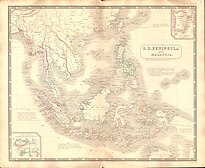
| History of Malaysia |
|---|
 |
|
|
Malaysia is a modern concept, created in the second half of the 20th century. However, contemporary Malaysia regards the entire history of Malaya and Borneo, spanning thousands of years back to prehistoric times, as its own history.[1][2][3]
The first evidence of archaic human occupation in the region dates back at least 1.83 million years, while the earliest remnants of anatomically modern humans are approximately 40,000 years old. The ancestors of the present-day population of Malaysia entered the area in multiple waves during prehistoric and historical times.[4][5]
Hinduism and Buddhism from India and China dominated early regional history, reaching their peak from the 7th to the 13th centuries during the reign of the Sumatra-based Srivijaya civilisation. Islam made its initial presence in the Malay Peninsula as early as the 10th century, but it was during the 15th century that the religion firmly took root, at least among the court elites, leading to the rise of several sultanates, the most prominent being the Sultanate of Malacca and the Sultanate of Brunei.[6]
The Portuguese were the first European colonial power to establish themselves on the Malay Peninsula and in Southeast Asia, capturing Malacca in 1511. This event led to the establishment of several sultanates, such as Johor and Perak. Dutch hegemony over the Malay sultanates increased during the 17th to 18th centuries, with the Dutch capturing Malacca in 1641 with the aid of Johor. In the 19th century, the English ultimately gained hegemony across the territory that is now Malaysia. The Anglo-Dutch Treaty of 1824 defined the boundaries between British Malaya and the Dutch East Indies (which became Indonesia), and the Anglo-Siamese Treaty of 1909 defined the boundaries between British Malaya and Siam (which became Thailand). The fourth phase of foreign influence was marked by a wave of immigration of Chinese and Indian workers to meet the needs created by the colonial economy in the Malay Peninsula and Borneo.[7]
The Japanese invasion during World War II ended British rule in Malaya. After the Empire of Japan was defeated by the Allies, the Malayan Union was established in 1946 and reorganized as the Federation of Malaya in 1948. In the peninsula, the Malayan Communist Party (MCP) took up arms against the British, leading to the declaration of emergency rule from 1948 to 1960. A forceful military response to the communist insurgency, followed by the Baling Talks in 1955, led to Malayan independence on August 31, 1957, through diplomatic negotiation with the British.[8][9] On 16 September 1963, the Federation of Malaysia was formed, but in August 1965, Singapore was expelled from the federation and became a separate independent country.[10][11] A racial riot in 1969 resulted in the imposition of emergency rule, the suspension of parliament and the proclamation of the Rukun Negara, a national philosophy promoting unity among citizens.[12][13] The New Economic Policy (NEP), adopted in 1971, sought to eradicate poverty and restructure society to eliminate the identification of race with economic function.[14]
Under Prime Minister Mahathir Mohamad, Malaysia experienced rapid economic growth and urbanization beginning in the 1980s.[15] The National Development Policy (NDP), succeeding the previous economic policy, was implemented from 1991 to 2000.[16] The Asian financial crisis of the late 1990s nearly caused the country's currency, stock, and property markets to collapse, though they subsequently recovered.[17] The 1MDB scandal came to prominence in 2015 as a significant global corruption scandal, implicating then-Prime Minister Najib Razak.[18] The scandal significantly influenced the 2018 general election, resulting in the first change of ruling political party since independence.[19] In early 2020, Malaysia faced a political crisis,[20] concurrent with the COVID-19 pandemic, leading to political, health, social, and economic disruptions.[21][22] The 2022 general election resulted in Malaysia's first hung parliament, leading to Anwar Ibrahim's appointment as Prime Minister on November 24, 2022.[23][24][25][26]
- ^ "History of Malaysia". Encyclopaedia Britannica. 2023. Retrieved 11 November 2024.
- ^ Gullick, J. M. (1987). Malaysia and Its Neighbours: Historical and Cultural Links. Oxford University Press.
- ^ Sejarah Malaysia (in Malay). Putrajaya: Malaysian Ministry of Education, Textbook Division. 2016.
- ^ Saidin, Mokhtar (2009). "The oldest stone tools found in Southeast Asia potentially rewrites our understanding of human origins". Southeast Asian Archaeology. Retrieved 11 November 2024.
- ^ Curnoe, Darren; Datan, Ib; Taçon, Paul S. C.; Leh Moi Ung, Caroline; Sauffi, Mohamad S. (2016). "Deep Skull from Niah Cave and the Pleistocene Peopling of Southeast Asia". Frontiers in Ecology and Evolution. 4: 75. Retrieved 11 November 2024.
- ^ Kamaruzaman, Azmul Fahimi; Omar, Aidil Farina; Sidik, Roziah (1 December 2016). "Al-Attas' Philosophy of History on the Arrival and Proliferation of Islam in the Malay World". International Journal of Islamic Thought. 10 (1): 1–7. doi:10.24035/ijit.10.2016.001. ISSN 2232-1314.
- ^ Annual Report on the Federation of Malaya: 1951 in C.C. Chin and Karl Hack, Dialogues with Chin Peng pp. 380, 81.
- ^ "Malayan Independence | History Today". www.historytoday.com. Retrieved 7 March 2023.
- ^ "Proclamation of independence of Malaya (Kuala Lumpur, 31 August 1957)". CVCE.EU by UNI.LU. The National Archives of the United Kingdom. 3 January 2017. Retrieved 7 March 2023.
- ^ Baten, Jörg (2016). A History of the Global Economy. From 1500 to the Present. Cambridge University Press. p. 290. ISBN 978-1-107-50718-0.
- ^ "Road to Independence". US Government. Retrieved 3 August 2013.
- ^ Othman, Al-Amril; Ali, Mohd Nor Shahizan (29 September 2018). "Misinterpretation on Rumors towards Racial Conflict: A Review on the Impact of Rumors Spread during the Riot of May 13, 1969". Jurnal Komunikasi: Malaysian Journal of Communication. 34 (3): 271–282. doi:10.17576/JKMJC-2018-3403-16. ISSN 2289-1528.
- ^ Esa, Mohd Sohaimi; Ationg, Romzi (2 December 2020). "Majlis Gerakan Negara (MAGERAN): Usaha Memulihkan Semula Keamanan Negara Malaysia" [National Operations Council (NOC): Efforts to Restore Malaysia's National Peace]. Malaysian Journal of Social Sciences and Humanities. 5 (12): 170–178. doi:10.47405/mjssh.v5i12.585. ISSN 2504-8562.
- ^ Jomo, K. S. (2005). Malaysia's New Economic Policy and 'National Unity. Palgrave Macmillan. pp. 182–214. doi:10.1057/9780230554986_8. ISBN 978-1-349-52546-1. Retrieved 24 September 2020.
- ^ Spaeth, Anthony (9 December 1996). "Bound for Glory". Time. New York. Archived from the original on 17 March 2009. Retrieved 20 August 2011.
- ^ "Rancangan Malaysia Keenam (RMKe-6), 1990-1995 | Portal Rasmi Kementerian Ekonomi". ekonomi.gov.my. Archived from the original on 24 February 2024. Retrieved 24 February 2024.
- ^ Ping Lee Poh; Yean Tham Siew. "Malaysia Ten Years After The Asian Financial Crisis" (PDF). Thammasat University. Archived from the original (PDF) on 1 April 2010. Retrieved 25 July 2011.
- ^ "Malaysian taskforce investigates allegations $700m paid to Najib". The Guardian. London. 6 July 2015. Archived from the original on 22 April 2020. Retrieved 24 March 2018.
- ^ "Malaysia election: Opposition scores historic victory". BBC News. 10 May 2018. Archived from the original on 4 April 2023. Retrieved 6 April 2019.
- ^ Cite error: The named reference
:9was invoked but never defined (see the help page). - ^ "Malaysia's GDP shrinks 5.6% in COVID-marred 2020". Nikkei Asia. Archived from the original on 31 July 2021. Retrieved 6 August 2021.
- ^ "Malaysia's Political Crisis Is Dooming Its COVID-19 Response". Council on Foreign Relations. Retrieved 2 September 2021.
- ^ Auto, Hermes (22 August 2022). "Umno meetings expose rift between ruling party's leaders | The Straits Times". www.straitstimes.com. Retrieved 22 January 2023.
- ^ "Malaysia elects first-ever hung parliament". BBC News. 20 November 2022. Retrieved 25 November 2022.
- ^ Mayberry, Kate. "Anwar sworn in as Malaysia's PM after 25-year struggle for reform". www.aljazeera.com. Retrieved 22 April 2023.
- ^ "Anwar Ibrahim sworn in as Malaysian PM after post-election deadlock". BBC News. 24 November 2022. Retrieved 22 April 2023.